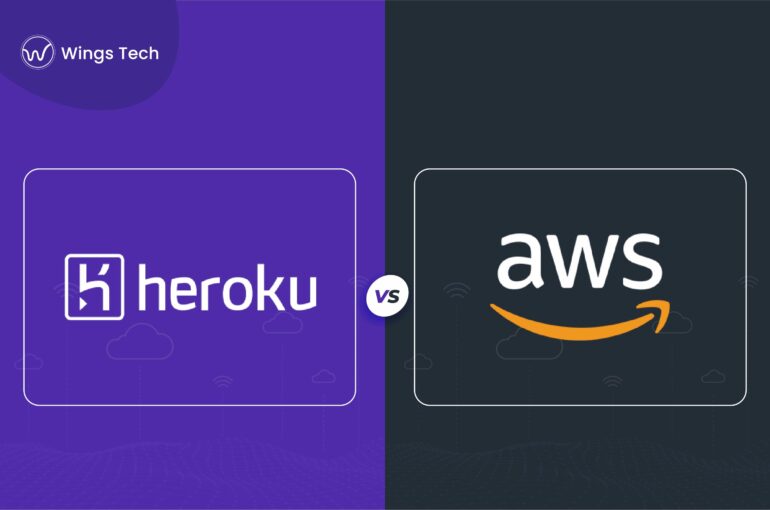Heroku vs AWS: Picking the right one for your Application

Our lives have already been impacted by the Internet and computer technologies to an extent where we have to stay current. Every invention we have made as a civilization aims to improve our lives, so we are able to get the most out of it in the long run. Even though your web project might be a fully-featured web app or even just a small API solution, you might be in a position where all that’s left to do is to publish your work.
It’s hard to deny the impact that apps like Facebook, Instagram, and Netflix have had on our society. How have these apps appeared? To be able to reach their users, they need to become fully operational. A hosting solution is required. It is important for them to have a “home” in order to function as they do now. AWS, Heroku, and other cloud computing services are their homes.
What is Heroku?
Platform as a Service (PaaS) is the main feature of the Heroku cloud platform. The platform runs on AWS.
AWS Elastic Compute Cloud is much more complex to use than its services. Build, deploy, and scale quickly with high efficiency. Part of its popularity is that it has add-on capabilities supporting multiple management tools and alerts.
Heroku is known to speed up development cycles as the infrastructure part is fully-managed.
Dynos – The Heart of Heroku.
The Heroku application uses something called Dynos to run the process once it is set up. This is a lightweight Linux container that allows it to scale effortlessly. Dynos come in three types:
- “Web” ones that deal with web-based processes
- “Worker” processes have to do with background jobs or anything else you can input
- “One-offs” are designed for one-time tasks like the migration of databases
Heroku enables you to add as many Dynos (or bigger Dynos, depending on the process) via the Command Line or the Dashboard. Dynos can decrease your app’s response time and increase RAM storage.
What is Amazon Web Services (AWS)?
Among Amazon Web Services’ services is Infrastructure as a Service (IaaS), which is offered through Amazon Web Services. There are numerous cloud services offered by AWS. There are two popular and widely used services provided by Amazon:
- Amazon Simple Storage (S3)
- and Elastic Compute Cloud (EC2)
AWS S3 is an object storage built specifically for storing and retrieving data from the web.
Elastic Compute Cloud (EC2) directs computing resources within Amazon’s computing environment.
With our service, you will have virtually unlimited scalability, performance, durability, availability, and security.
Comparison Table
Here’s a quick glance at the comparison table of these two popular PaaS.
| Heroku | AWS | |
| Owner | Salesforce | Amazon |
| Host | AWS | EC Instances |
| Pricing | With a rate of $0.05/hour | Rates start at $0.013/hour |
| Service Type | PaaS | IaaS |
| Program Languages | Python, Java, Ruby, Scala, Go, PHP, and more | Python, Docker, Ruby, NodeJS, Go, PHP, and more |
| Complexity | Non-techies will love it, as it’s quite simple and user-friendly | It is a little sophisticated and requires professional expertise. |
| Business Use | Companies in the startup and small business sectors | The size of the organization doesn’t matter |
| Computational Skills | Low | High |
| Deployment | A comprehensive, ready-to-use solution | Increasingly Difficult and Complex |
| Management Tools | Heroku CLI, App Metrics, Heroku Connect, and Heroku Status | AWS CLI and Management Console |
| Key Features | The virtualization of containers (dynos), horizontal and vertical scaling, as well as software flexibility. | A number of deployment options, App monitoring, and tracking, and flexibility to add or edit any service as needed |
The Verdict? Heroku or AWS?
Truth be told? It depends on you and your organization. The sheer volume of choices made possible by Amazon Web Services (AWS) gives organizations of all sizes the ability to find what they are looking for.
The Amazon Web Services ecosystem has a rich set of tools, services, and apps that businesses can utilize. AWS can be complex to use, especially outside the Beanstalk platform, and requires knowledgeable DevOps specialists, either in-house or contracted.
The Heroku product is less intimidating and offers a single function.
There is no doubt that it streamlines app deployments and it does it well. The Heroku cloud platform may be a good option for startups and anyone who needs to deploy smaller apps without having a lot of technical know-how.
Both of these options are viable options depending on the organizational needs at hand.
AWS is an area in which Wings Tech has strong technical expertise. We’d be glad to walk you through your options as a technology partner and help you determine the most appropriate tech stack for your business. We are available to help!


















